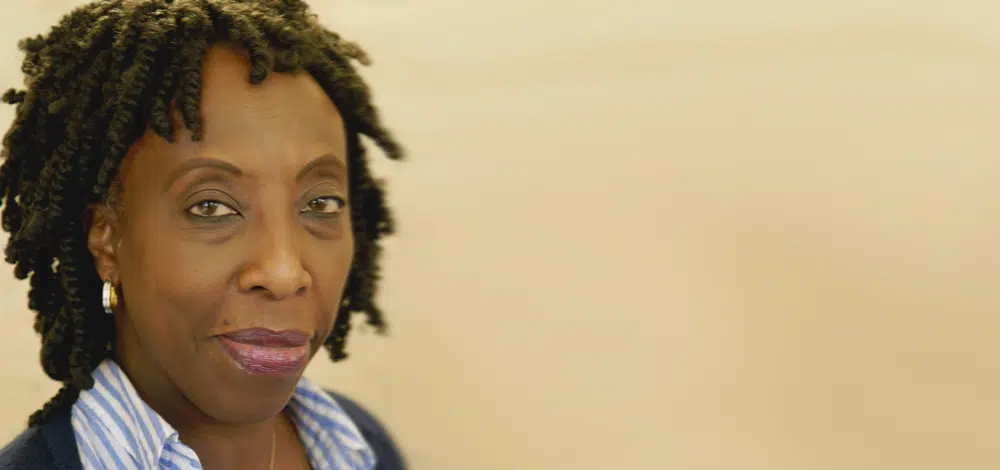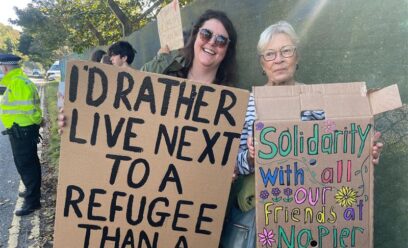International Women’s Day: Q & A with Alphonsine Kabagabo, Director of Women for Refugee Women
Posted by IMIX on March 7, 2022For International Women’s Day 2022, we talk to Alphonsine Kabagabo, the Director of Women for Refugee Women, an organisation that advocates for and empowers women refugees.

As a survivor of the Rwandan genocide, Alphonsine is one of the few women with lived experience leading an organisation in the refugee and migration sector. She comes to the role after more than 20 years of experience in leadership roles for the World Association of Girl Guides and Scouts.
On International Women’s Day, she speaks about the importance of women with lived experience leading in the sector – and what we need to do to ensure their voices are heard.
How did you come to be in the role? What interested you in it?
‘I have been the Director at Women for Refugee Women for about one year and two months now. There were two things that really attracted me to this role.
‘Firstly, I’ve always wanted to work for an organisation that lifts up vulnerable women through empowerment activities. To make sure that they are heard and have the confidence to rebuild their lives.
‘I wanted to empower those who are neglected in society for different reasons, not just because you are a woman, but the fact you are a refugee as well.
‘This speaks to the second reason I was interested in this role. I have been a refugee myself. I know how it feels when you’re in that situation. I know that you come with skills and experience and people don’t even realise that you have those things. I know the discrimination you face.
‘And so I told myself, “If I can go into that organisation, I can empower women like me to speak out, to have a voice.”
‘It was also exciting for me to support refugees, asylum seekers and women – people in those intersections – to really be recognised. To be part of an organisation that respects the stories of women and gives credit to them.’
Have you always been interested in working with vulnerable women?
‘I came to this role after having worked for many years for the World Association of Girl Scouts. And my main role was to work with young women in Africa and run programmes that give them the chance to build skills and confidence, to challenge injustice and fulfil their potential. So yes, I got to support women like me to use their voices. Now, I get to give back to this country, that I first came to more than 23 years ago.’
How do you feel having lived experience impacts your current role?
‘To put it simply, I can see myself in the shoes of the women we work with very easily. I identify with them. When we are working on programmes and activities, I think, “That was me 25 years ago, and these are the sorts of activities I wanted to see when I was in that situation.” So it really gives me more energy, more motivation.
‘But I was a refugee 25 years ago. So many things in the asylum system have changed since then. And I was aware of that. I joined Women for Refugee Women during the pandemic, so it was a difficult time to do it from my bedroom. However, I have been able to get to know the organisation and we have just finalised our new strategic plan which ensures that the voices of the women we serve is central to all we do., As part of this process we put together a focus group of women who are in our network to create a deep understanding of their needs. Who are they? What do they want and need? What excites them?
‘And it’s about asking, “What difference do you want us to make with you? Not for you, with you. How are we going to make a difference together?”
‘So the first thing is to really understand, “Where are they now? What they want to be? And how they will be part of the changes?”’
This year’s International Women’s Day theme is #BreakingTheBias
What are some of the challenges you’ve faced as a woman with lived experience leading an organisation?
‘One of the biggest is feeling assured that I am not just there to tick a box. My lived experience is valuable, but I have also the skills and the experience required to do the job.
‘And being a director means I run an organisation, including strategy, finance, and fundraising. And that recognition is important.
‘We must make sure that people with lived experience, and women especially, are not just there to be seen.
‘More widely speaking, another challenge is ongoing solidarity. For instance, around the time of the Black Lives Matter movement, everyone was really interested in voices of lived experience. I was getting lots of media interview requests. But it felt almost fashionable, like a trend, because the attention suddenly stopped. So we need to make sure we include the voices of people with lived experience of seeking asylum consistently.
‘What is the importance of people – and women – with lived experience leading in the sector?
‘We need to ensure that any event or project has people with lived experience included from the very beginning. So that we are working with and not just for them.
‘Because we can only truly make a difference by getting people with experience to be part of the whole process.
‘That’s the big change that I am trying to make. In my view, there’s scope for improvement in how we involve people with lived experience.
‘We need to make sure we are not talking down to people as “poor refugees”. Women in the asylum system need to be in charge and be part of the decision-making process. We need to build the confidence of us as people with lived experience to speak out, to be independent.
‘That is the change the women we work with want to see. To be part of the decision making in organisations, so you’re not just the face.
‘Change also comes from the ground up, so we need to build grassroots support and capacity.
‘So at the moment, we are thinking about how we can build networks with grassroots organisations and encourage women with lived experience in those groups to speak out within their communities. That kind of solidarity, that is how we make a difference.
‘We need women with lived experience to also build solidarity with other women and groups who are sympathetic. That is one of our aims at Women for Refugee Women, because we need that coalition of voices working together.’
What advice would you give to how the sector works with people with lived experience?
‘Don’t just invite people to meetings with financial incentives. Money is important, and it’s a massive need. But it’s also important to have training to be able to be heard in the same way as others, to do strategic plans and advocacy strategies.
‘The biggest change will happen when we increase the capacity of grassroots organisations run by people with lived experienceto be independent. This is what we hear from our focus groups; that was the biggest need we heard. The change will happen when people with lived experience are not involved in a tokenistic way, but genuinely.
‘Trustees are also have the biggest decision-making power in an organisation, so it’s important that there are a good number of people with lived experience on boards of trustees. But it’s also important to ensure that they are supported to have a voice, to contribute equally.
‘You also need to create an environment where they can speak up and hold you accountable.
‘For example, I mentored one of our current trustees who is a woman with lived experience. That is valuable because she can now challenge us based on her experience and say, “This programme is not going to work.”
‘Many women with lived experience are prevented from being fully recognised for their skills. For example, I knew a woman who volunteered with a refugee organisation for ten years while she was unable to work.
‘But when she got her right to work, she said she felt as if people were still looking at her like a volunteer instead of as a professional. So she set up her own organisation.
‘So we need to take women seriously and they themselves need to overcome that internal barrier, in their confidence as well.’
Any final thoughts on women with lived experience leading the way?
‘As I said, women need to be supported overcome the barriers within themselves, but also as leaders we need to make sure that we are creating those opportunities and ensure they are accessible as well.’



